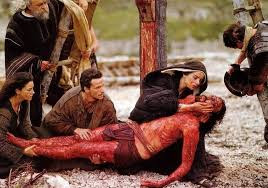A Painful Death
A PAINFUL DEATH
Sometimes I think to myself as to
why would Our Lord and Saviour have to undergo such a painful and horrendous
death? After all, He could have saved humankind in the blink of an eye. He is
God, almighty Sovereign Lord, King of the universe. Bishop Sheen in his book, “Life of Christ”, gives us a beautiful
explanation in regard to the reason as to why Our Lord had to go through an
excruciating painful death,
It
was not enough that the Son of God should come down from the heavens and appear
as the Son of Man, for then He would have been only a great teacher and a great
example, but not a Redeemer. It was important for Him to fulfil the purpose of
His coming, to redeem humankind from sin while in the likeness of human flesh.
Teachers change men by their lives; our Blessed Lord would change men by His
death. The poison of hate, sensuality and envy which is in the hearts of men
could not be healed simply by wise exhortations and social reforms. The wages
of sin is death and therefore it was to be by death that sin would be atoned
for. As in the ancient sacrifices the fire symbolically burned up the imputed
sin along the with the victim, so on the Cross, the world’s sin would be put
away in Christ’s sufferings, for He would be upright as a priest and prostrate
as a victim.
For all the great teachers,
philosophers and spiritual leaders, death was seen as a stumbling block. For
our Blessed Lord, however, death was a new beginning to a great reality. When
Socrates was given the hemlock juice, his message was cut off once and for all.
Death was a stumbling block to Buddha and his teachings of the 8-fold way. The
last breath of Lao – Tzu rang down the curtain on his doctrine concerning the
Tao or ‘doing nothing’ as against aggressive self – determination. Socrates had
taught that sin was due to ignorance and that therefore, knowledge would make a
good and perfect world. The Eastern teachers were concerned about the human
person being caught up in some great wheel of fate. Hence the recommendations
of Buddha that men be taught to crush their desire and thus find peace. When
Buddha died at the age of 80, he pointed not to himself but to the law he had
given.
Our Blessed Lord, on the other hand,
in His talk to Nicodemus, proclaimed Himself as the Light of the World but what
is more important is that no one would understand His teaching while He was
alive, but rather His death and Resurrection would be essential to
understanding it. No other teacher in the world ever said that it would take a
violent death to clarify His teachings. Here was a teacher Who made His
teachings so secondary that He could say that the only way that He would ever
draw men to Himself would be not by His doctrine, not by what He said but by
His Crucifixion.
His death, then instead of being the
last of a series of failures, would be a glorious success, the climax of His
mission on earth. It was only after they had put Him to death that they would
know that He spoke the Truth.
Thus, the Crucifixion of our Blessed
Lord was not for the sake of dying but for a greater good. This also goes to
show that suffering co – exists with glory.
On a personal note, I would like to
conclude that in life, in a very broad sense, nothing comes without effort
(unless if you cheat the system) and yet when it comes to our salvation, there
is nothing that you can do to ‘cheat’ the system. You’re either in or out.
Either you are for God or you’re against Him as the Book of Revelation puts it
very beautifully, “Because you are lukewarm and neither cold nor hot, I will spew you out
of my mouth” (Rev 3: 16). God knows us better than we know ourselves.
Let us not forget that it is for our sins that our Lord bore the pain on the
Cross and may we , following the example of our Blessed Lord, learn to carry
our own crosses.




